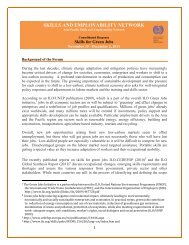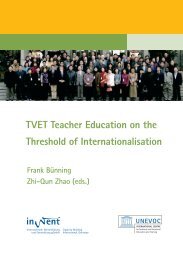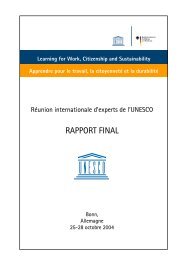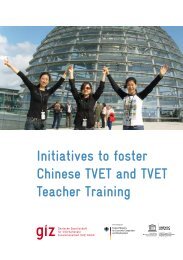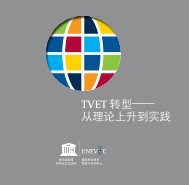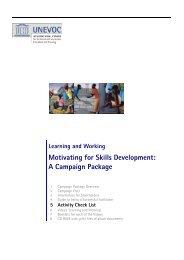Lifelong learning and training: a bridge to the future - Unesco-Unevoc
Lifelong learning and training: a bridge to the future - Unesco-Unevoc
Lifelong learning and training: a bridge to the future - Unesco-Unevoc
Create successful ePaper yourself
Turn your PDF publications into a flip-book with our unique Google optimized e-Paper software.
undertake fur<strong>the</strong>r study beyond that of senior secondary school. Higher education<br />
institutes such as polytechnic universities, polytechnic colleges <strong>and</strong> junior colleges<br />
should <strong>the</strong>refore be streng<strong>the</strong>ned <strong>and</strong> equipped as lifelong educational institutions<br />
allowing people of all ages <strong>to</strong> receive fur<strong>the</strong>r occupational education. Flexible access<br />
<strong>to</strong> vocational education <strong>and</strong> <strong>training</strong> throughout life should be ensured.<br />
iv) A School-<strong>to</strong>-work transition (STWT) system must be developed. STWT should begin<br />
in <strong>the</strong> earliest years of schooling, combining efforts in educational improvement,<br />
workforce development <strong>and</strong> economic development. The goal of STWT is <strong>to</strong> smooth<br />
<strong>the</strong> transition process for all students, including college-bound <strong>and</strong> non-college-bound<br />
youth, disadvantaged youth <strong>and</strong> out-of-school youth. The system seeks <strong>to</strong> find a<br />
balance in preparing students for “real jobs” without limiting <strong>the</strong>ir employment <strong>and</strong><br />
school opportunities. The components of <strong>the</strong> system are:<br />
(a) work-based <strong>learning</strong>;<br />
(b) school-based <strong>learning</strong>;<br />
(c) connecting activities which articulate between <strong>the</strong> school-based <strong>and</strong> work-based<br />
components; <strong>and</strong><br />
(d) career-awareness programmes.<br />
v) Enterprise <strong>training</strong> should be encouraged. Companies, particularly those which<br />
invested in technology-intensive industries, require a continuous updating of skills<br />
<strong>and</strong> knowledge for which formal schools are inadequately prepared. Companies<br />
provide <strong>the</strong> best setting for workers <strong>to</strong> acquire <strong>the</strong> work-related knowledge <strong>and</strong> skills<br />
necessary <strong>to</strong> absorb <strong>future</strong> technology speedily. Enterprises have <strong>to</strong> become “places of<br />
<strong>learning</strong>” in addition <strong>to</strong> being places of work. Training policies should encourage<br />
enterprises <strong>to</strong> provide fur<strong>the</strong>r <strong>training</strong> of <strong>the</strong>ir employees.<br />
∼ 26 ∼




